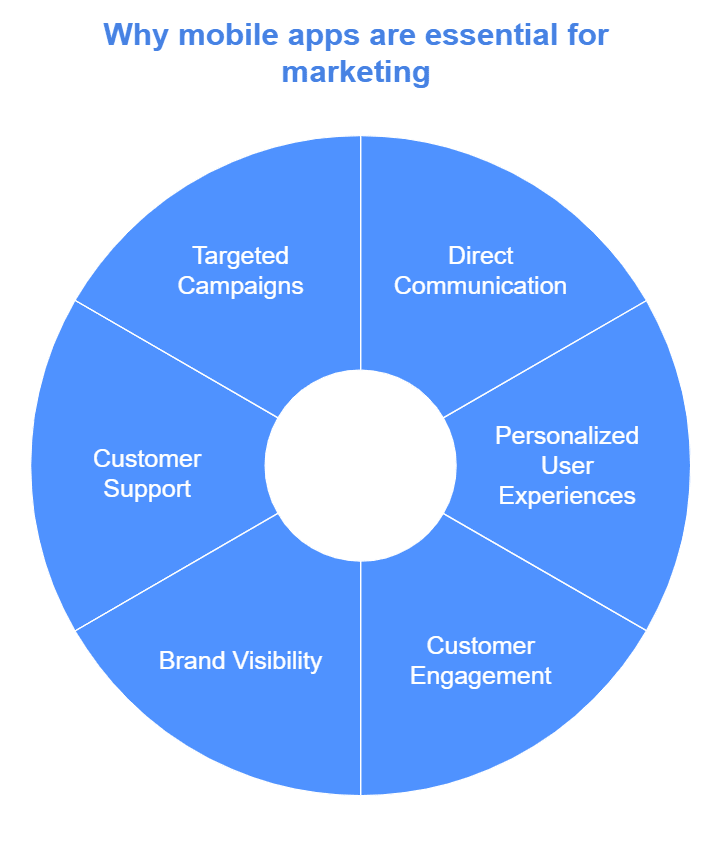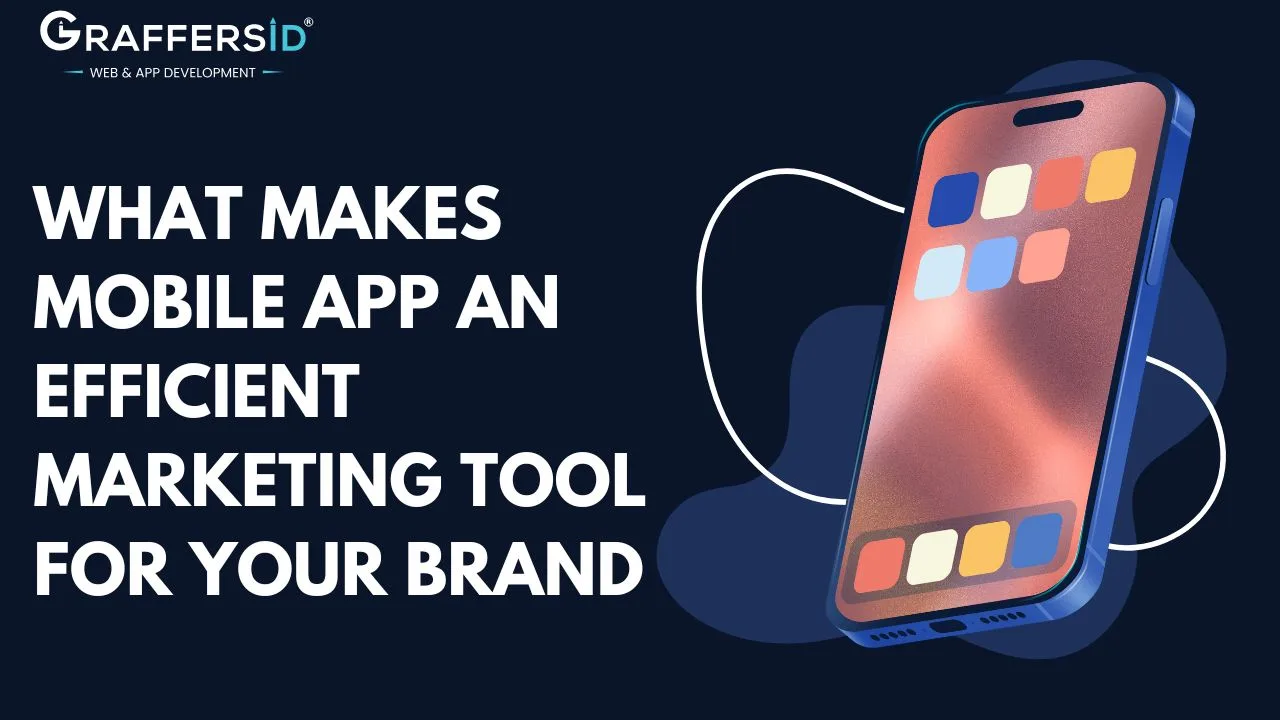In today’s fast-paced digital world, brands are constantly looking for better ways to increase their reach and attract new customers. Mobile applications have emerged as a game changer for this very purpose, enhancing how companies sell their products and services. A well-designed mobile app can act as an effective marketing tool, providing customers with tailored experiences, seamless interactions, and direct connections. Mobile apps can help build brand loyalty and drive sales further.
In this blog, we will look at the importance of mobile applications in this age, its key features, and how they can drive brand growth.
Popularity of Mobile Apps
The explosive growth of smartphones has changed the way people interact with brands. Mobile applications have become critical to this shift, giving businesses a direct and constant presence on the user’s device. Whether it’s for shopping, entertainment, or social connection, mobile apps help provide customers with a personalised and convenient experience that websites sometimes fail to match.
Recent studies suggest that there are more than 3.9 billion smartphone users worldwide, who spend an average of 4.8 hours a day on their phones. These numbers indicate that out of the total retail e-commerce sales for 2021, e-commerce apps contributed about 73%. Thus, apps are quite significant in the economy today. This dependence on apps opens up an excellent opportunity for organizations to integrate marketing efforts with the everyday routines of their target audience.
Read Also: Cost of making a mobile app
Why mobile apps are essential for marketing
Mobile apps offer unique advantages that traditional marketing tools might lack. Below are ways in which they triumph over the existing tools.
Direct communication with the customers
Mobile apps have become the means through which users directly communicate with brands. Features like push notifications, in-app messages, and alerts allow businesses to share real-time updates about their products and offers. This direct communication ensures that your message does not get lost in the mail or go unnoticed.
Personalized User Experiences
At the root of successful marketing lies personalization, and nothing embodies this better than mobile apps. They analyze the patterns of usage, preferences, and purchases of an individual user and offer unique recommendations and promotions such as personalized products, discounts, and messages. All these personalized touches create a feeling of being valued, increasing the chances of repeat business and loyalty towards the brand.
Boosting Customer Engagement
Mobile applications have been developed to incorporate features like gamification, social sharing, and interactive content that support intimate interaction. For example, adding a quiz, a poll, or an online mini-game will make the application experience more fun and increase engagement among users. Such activity bonds well with customers and collects information about the activity for use in future marketing efforts.
Enhancing Brand Visibility
A mobile application will always be on a user’s device, unlike a website where they get to decide whether or not to they want to use it. The app icon will be a constant reminder every time users scroll through their phones. This reminder reinforces recall and makes sure that your business stays on top of their minds.
Improving Customer Support
Mobile applications offer customer care integration through tools like chatbots, and live support with FAQs, all incorporated into one easy application. Now users may get the support they need without leaving the app, resulting in increased satisfaction rates. First-time users can become long-term supporters of your brand with the right kind of support experience.
Collecting Data for Targeted Campaigns
Applications on mobile have all types of user data available. From demographics to behavior patterns, this information can create hyper-targeted marketing campaigns for businesses that resonate with specific audience segments. Improve the effectiveness of your campaigns through such data, and ROI will also increase.

Features That Make Mobile Apps a Marketing Powerhouse
Several features set mobile apps apart as powerful tools for driving marketing success. Here are some of the most impactful features.
Push Notifications
Push notifications are one of the most effective ways to grab the users’ attention. With open rates of almost 90%, they email marketing by a wide margin. Brands can use notifications to send timely alerts regarding flash sales, new launches, or order updates. The immediacy of push notifications ensures that users stay informed and engaged.
Loyalty Programs
Mobile apps facilitate the establishment and supervision of loyalty systems to benefit users by offering perks for repeat purchases or requested behaviors. For instance, an application from a coffee shop allows people to earn points with each purchase and eventually redeem them for free beverages. Such programs are designed to encourage the return of the users more frequently and, through this, lead to becoming attached to the brand over time.
Social Media Integration
Social media integration is a function whereby the user can simply share activities, reviews, or purchases through different platforms such as Instagram, Twitter, or Facebook. This organic sharing expands your brand’s visibility and can even lead to viral marketing opportunities.
Location-Based Marketing
Mobile applications can tap into GPS and geo-fencing capabilities to reach their users with notifications about specific locations. An example is a restaurant app that notifies users about discounts only when they come near the establishment. This way, marketing would be more applicable and would lead to higher conversions.
In-App Purchasing
This feature has greatly simplified the entire customer journey, allowing users to browse, select, and directly purchase through the app. This has gone a long way in minimizing the friction for making purchases and even encouraging impulse buying among the users.
Augmented Reality (AR)
AR features have become a standout tool for engaging users. Brands like IKEA use AR to let customers visualize furniture in their homes, while beauty brands like Sephora enable users to try makeup virtually. These interactive features create memorable experiences that can drive sales and customer satisfaction.
Mobile App Strategies for Effective Marketing
To leverage the full potential of mobile apps, businesses need to adopt effective strategies. Below are some actionable tips to make your app a marketing success.
Build a User-Centric Design
An intuitive and attractive design is essential to hold user attention. The navigation has to be simple and the features should be easy to access. An app of this caliber allows users to find what they are looking for quickly thereby enhancing their user experience and improving retention levels.
Optimize App Store Presence
Your app’s listing on Google Play and the Apple App Store is the first touchpoint for potential users. Use relevant keywords, high-quality images, and a clear description to make your app stand out. Positive reviews and ratings also play a crucial role in convincing users to download your app.
Use Gamification
Gamification elements such as points, badges, as well as leaderboards might increase the interaction of your app. For example, a fitness app might reward users with badges for doing weekly workout challenges. These elements would encourage users to use their app regularly – and also fill them with a sense of accomplishment and competition against others.
Leverage Analytics
Analytical tools provide a dozen different insights into user behavior, app performance, and marketing ROI measurement. Metrics that give a good indication area such as user retention, session duration, and conversion rates can be assessed continuously to ascertain what is working well and what needs to be improved. This makes it data-driven, thus optimizing one’s marketing at all times.
Cross-Promote Through Other Channels
If you want to increase downloads and engagement, ensure that you promote your app across every possible channel like your website, your social media accounts, as well as your email newsletter. Stress those features and benefits that users will have exclusive access to through your app to ensure maximum conversion.
Conclusion
Mobile applications have become an indispensable tool in modern marketing, offering brands unparalleled benefits and opportunities to connect with their target audience. By providing direct communication, personalized experiences, and interactive features, apps help businesses attract and retain customers. Their ability to integrate with daily routines, collect valuable user data, and offer convenience has made them a cornerstone of effective marketing strategies.
As the digital marketing scene evolves, building a mobile app for your brand is a much more evident need in order to grow. With the right features and strategies, a mobile app can serve as a powerful medium to build brand loyalty, enhance visibility, and drive consistent growth. Contact us at GraffersID to get your application built today, and ensure the success of your brand in the future!




